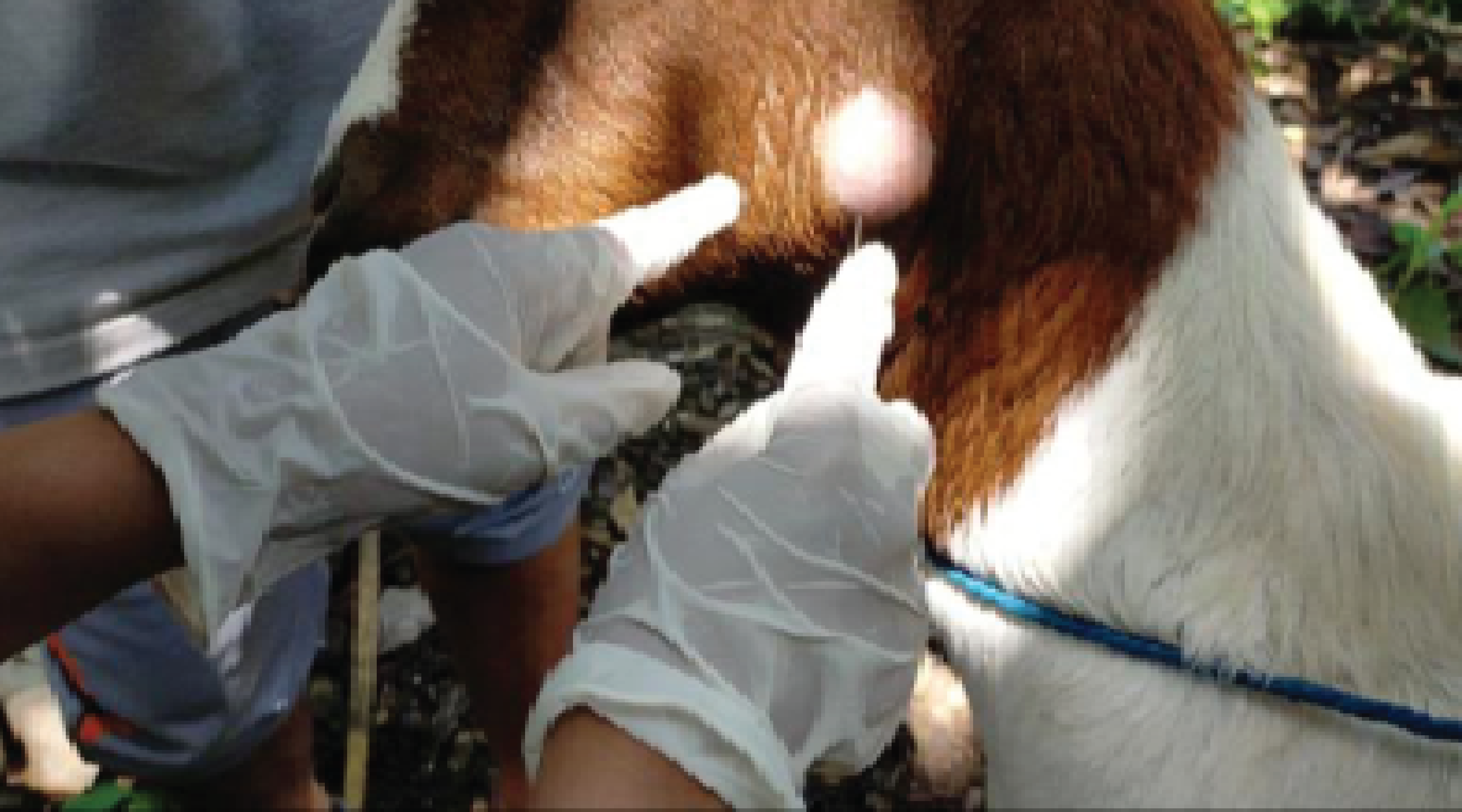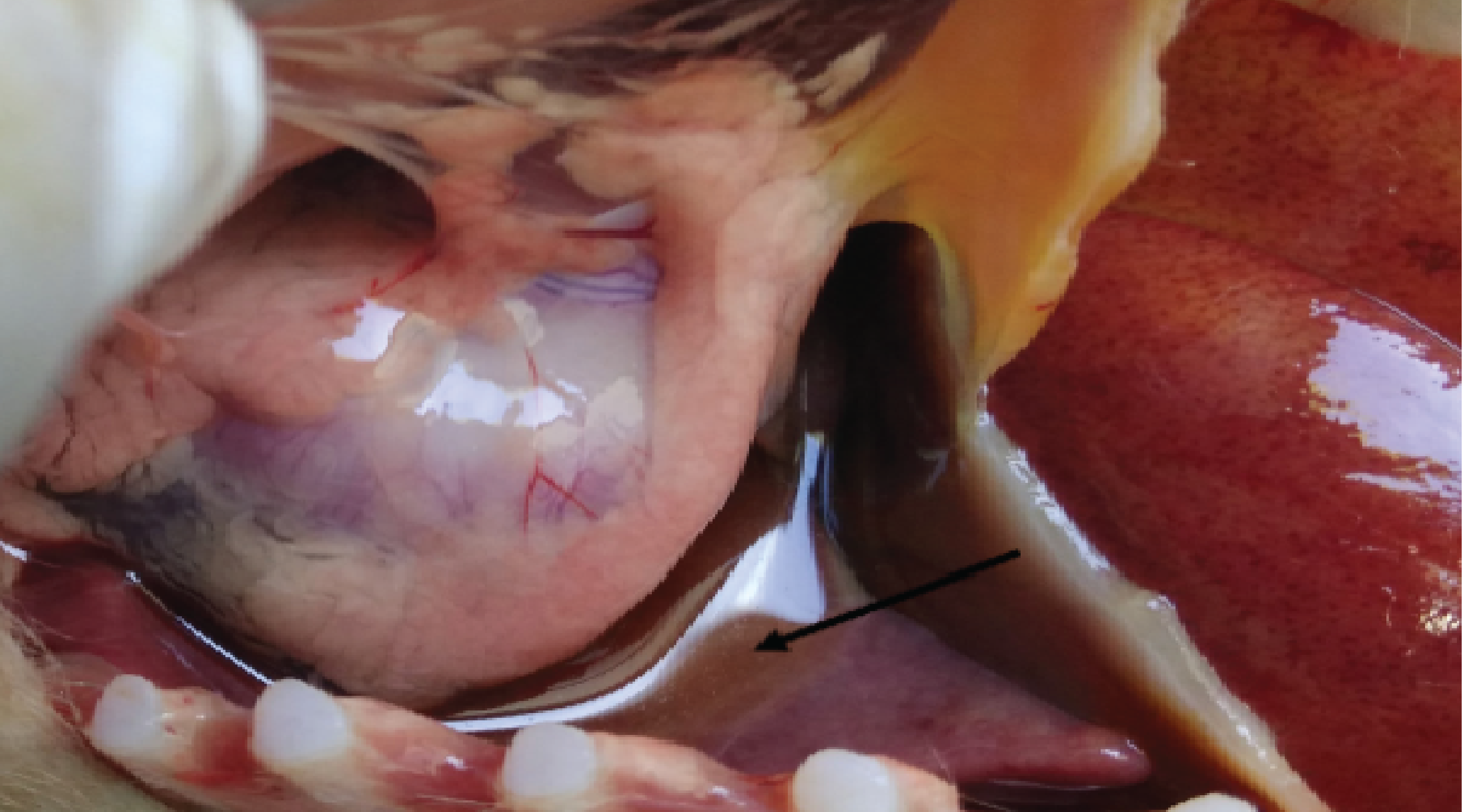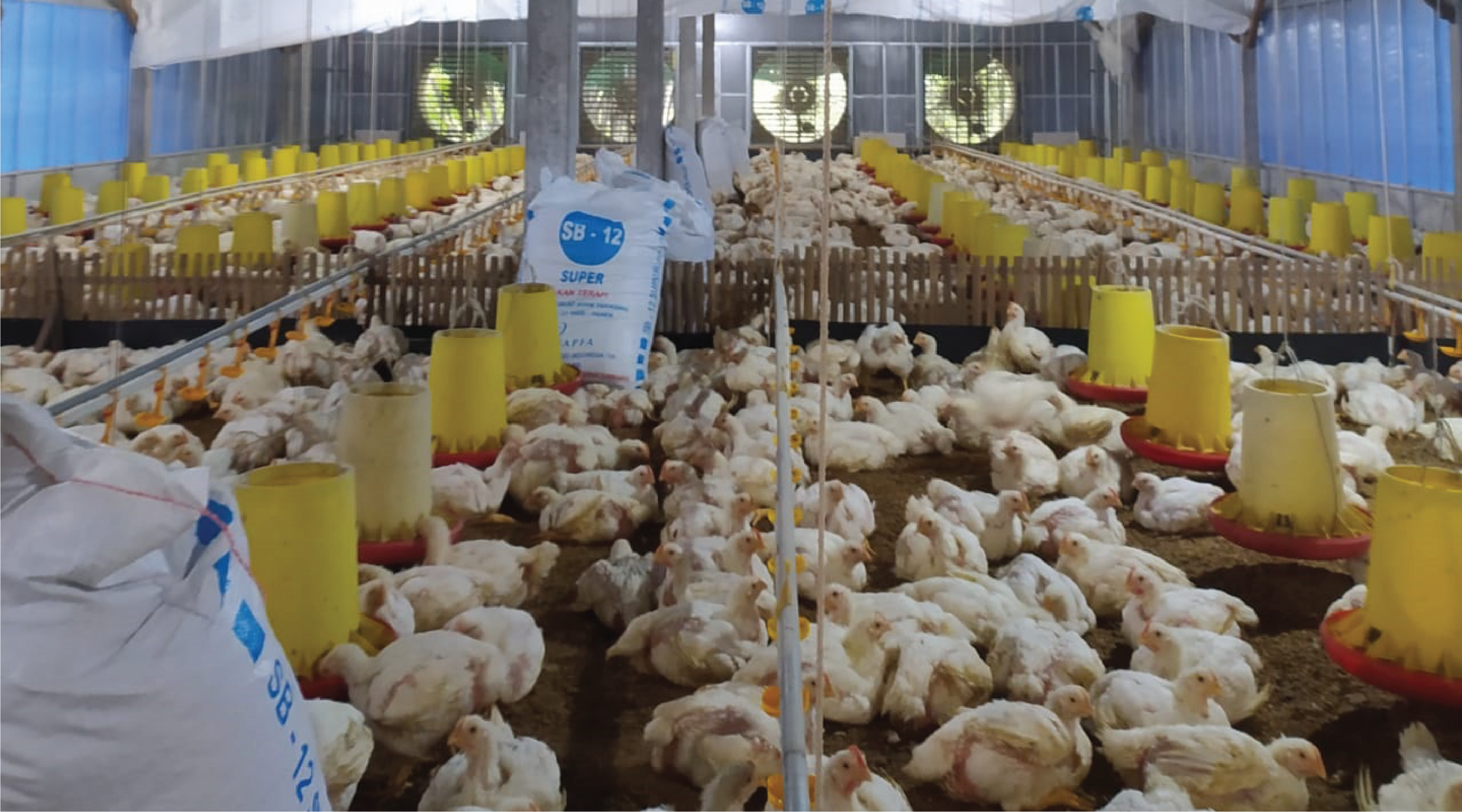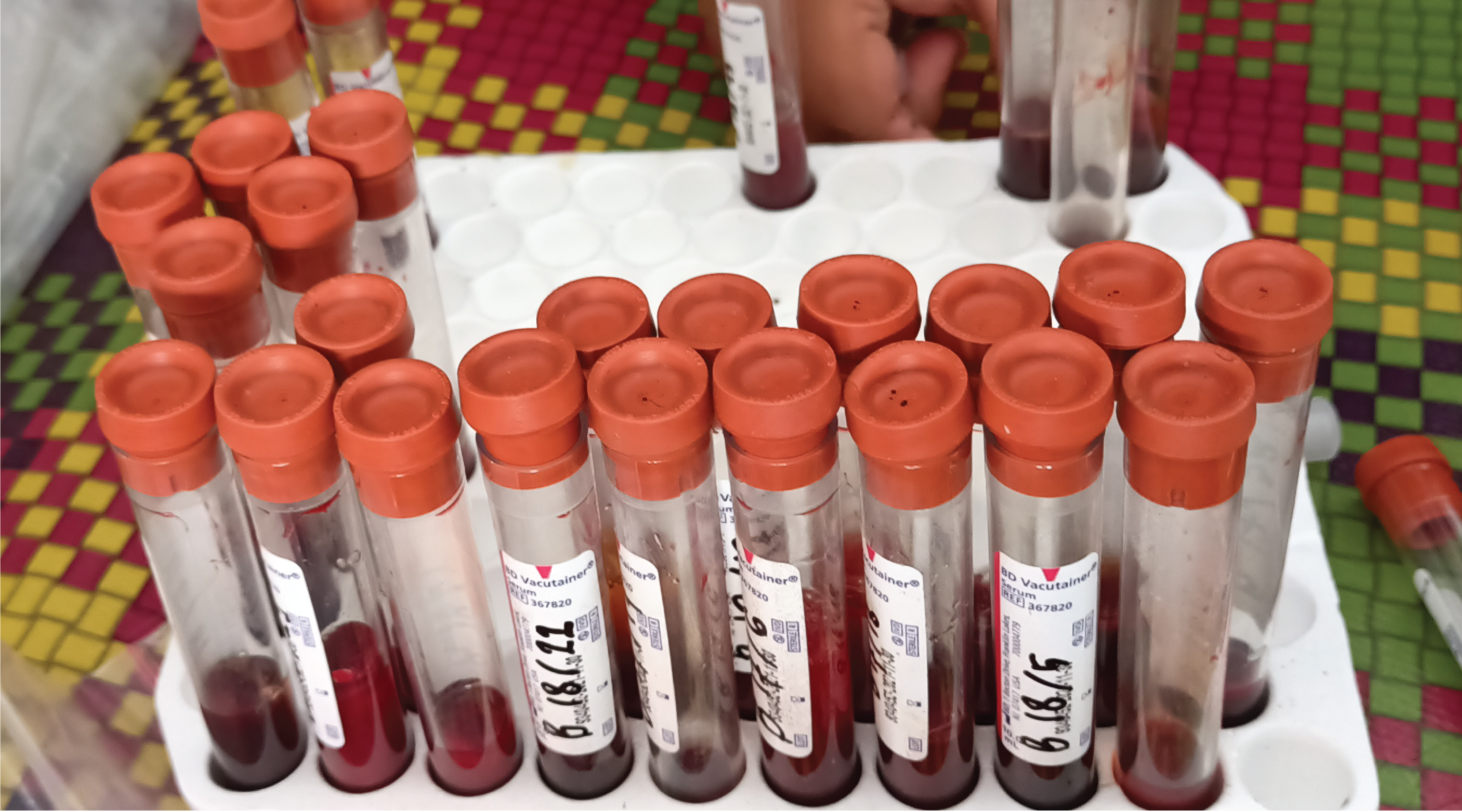Effectiveness Therapy to Eliminate Parasite in Cattle at Teaching Factory Polytechnic State of Lampung
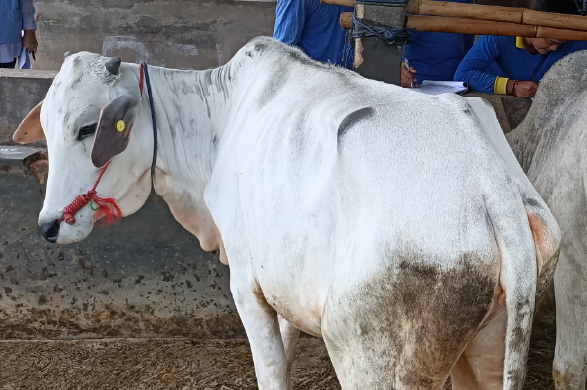
Downloads
Background: Gastrointestinal parasitic infections remain a significant global health concern in livestock, involving parasites from the Trematoda, Cestoda, and Nematoda classes. These infections can severely impact animal health and productivity. Purpose: This comparative study to evaluate the effectiveness of oral albendazole versus subcutaneous ivermectin in reducing gastrointestinal parasite infestations in cattle maintained at the Teaching Factory of the State Polytechnic of Lampung. Case: Eight cattle exhibited clinical signs including emaciation, dull coat, foul-smelling and dark-colored feces, with body temperatures ranging from 38.2°C to 38.6°C. Appetite and activity levels remained within normal limits. The animals had a recorded history of deworming (July 2023) and foot and mouth disease (FMD) vaccination. Case Management: Anthelmintic therapy was administered using either oral albendazole or subcutaneous ivermectin. Conclusion: Gastrointestinal and ectoparasitic infestations can lead to significant economic losses in livestock production. Subcutaneous administration of ivermectin proved to be more effective than oral albendazole in reducing gastrointestinal parasite infestation in cattle.
Abdullahi, A., K. Y. Yeong., 2024. Targeting Disease with Benzoxazoles: A Comprehensive Review of Recent Developments. Medicinal Chemistry Research, 33(3), 406–438.
Akande, F., and Alohutade, M., 2021. Diagnosis of Bovine Gastrointestinal Parasites: Comparison of Different Techniques and Different Solutions. Annals of Parasitology, 67(3), 407-416.
Alowanou, G.G., Adenilé, A.D., Akouèdegni, G.C., Bossou, A.C., Zinsou, F.T., and Akakpo, G.C.A., 2021. A comparison of Mini-FLOTAC and McMaster Techniques in Detecting Gastrointestinal Parasites in West Africa Dwarf Sheep and Goats and Crossbreed Rabbits. Journal of Applied Animal Research, 49(1), 30–38.
Babják, M., Königová, A., Burcáková, L., Komáromyová, M., Dolinská, M.U., and Várady, M., 2021. Assessing the Efficacy of Albendazole Against Fasciola Hepatica in Naturally Infected Cattle by In Vivo and In Vitro Methods. Veterinary Sciences, 8(11), 249.
Barrón-Bravo, O.G., Hernández-Marín, J.A. Gutiérrez- Chávez, A.I., 2020. Susceptibility of Entomopathogenic Nematodes to Ivermectin and Thiabendazole. Chemosphere, 253(1), 126658.
Castillejos-López, M., Torres-Espíndola, L.M., Huerta-Cruz, E., Flores-Soto, J.C., Romero-Martinez, B.S., and Velázquez-Cruz, R., 2022. Ivermectin: A Controversial Focal Point During the COVID-19 Pandemic. Life, 12(9), 1384.
Celis-Giraldo, C.T, Ordóñez, D., Roa, L., Cuervo-Escobar, S.A., Garzón-Rodríguez, D., and Alarcón-Caballero, M., 2020. Preliminary Study Ofivermectin Residues in Bovine Livers in the Bogota Savanna. Revista Mexicana de Ciencias Pecuarias, 11(2), 311-325.
Chai, J.Y., Jung, B.K., and Hong, S.J., 2021. Albendazole and Mebendazole as Anti-Parasitic and Anti-Cancer Agents: An Update. The Korean Journal of Parasitology, 59(3), 189–225.
Dziduch, K., Greniuk, D., and Wujec, M., 2022. The Current Directions of Searching for Antiparasitic Drugs. Molecules, 27( 5), 1534.
El-Saber Batiha, G., Alqahtani, A., Ilesanmi, O.B., Saati, A.A., El-Mleeh, A., and Hetta, H.F., 2020. Avermectin Derivatives, Pharmacokinetics, Therapeutic and Toxic Dosages, Mechanism of Action, and Their Biological Effects. Pharmaceuticals, 13(8), 196.
Failoc-Rojas, V.E., Silva-Díaz, H., Maguiña, J.L., Rodriguez- Morales, A.J., Díaz-Velez, C., and Apolaya-Segura, M., 2023. Evidence-Based Indications for Ivermectin in Parasitic Diseases: An Integrated Approach to Context and Challenges in Peru. Parasite Epidemiology and Control, 23(1), e00320.
Fairweather, I., Brennan, G.P.R., Hanna, E.B., Robinson, M.W., and Skuce, P.J., 2020. Drug Resistance in liver flukes. International Journal for Parasitology. Drugs and Drug Resistance, 12(1), 39–59.
Gałązka M., Klich, D., Anusz, K., and Pyziel-Serafin, A.M., 2022. Veterinary monitoring of Gastrointestinal Parasites in European Bison, Bison Bonasus Designed for Translocation: Comparison of Two Coprological Methods. International Journal for Parasitology: Parasites and Wildlife, 17(1), 166–173.
Gkimprixi, E., Lagos, S., Nikolaou, C.N., Karpouzas, D.G., and Tsikou, D., 2023. Veterinary Drug Albendazole Inhibits Root Colonization and Symbiotic Function of the Arbuscular Mycorrhizal Fungus Rhizophagus Irregularis. FEMS Microbiology Ecology, 99(6), fiad048.
Hafiz, A., Tufani, N.A., and Makhdoomi, D.M., 2010. Therapeutic Efficacy Of Ivermectin, Fenbendazole And Albendazole Against Ascariasis In Crossbred Calves.The Indian Journal of Field Veterinarians, 6(2), 21-22.
Husin, N., Pasaribu, A.P., Ali, M., Suteno, E., Wijaya, W., and Pasaribu, S., 2022. Comparison of Albendazole and Mebendazole on Soil-Transmitted Helminth Infections Among School-Aged Children. Open Access Macedonian Journal of Medical Sciences, 10(B), 1264-1270.
Hutchinson, G.W., 2009. Nematode Parasites of Ruminants. Australia and New Zealand Standard Diagnostic Procedures, 3(1), 1-6.
Ignacio, A. L., Valentina, C., Lucila, M., Paula, D., Candela, C., and Carlos, L., 2023. Feeding Management and Albendazole Pharmacokinetics in Pigs. Animals, 13(3), 474.
Jones, B.P., Vliet, A.H.M.V., LaCourse, E.J., and Betson, M., 2022. Identification of Key Interactions of Benzimidazole Resistance-Associated Amino Acid Mutations in Ascaris β-Tubulins by Molecular Docking Simulations. Scientific Reports, 12(1), 13725.
Kappes, A., Tozooneyi, T., Shakil, G., Railey, A.F., McIntyre, K.M., and Mayberry, D.E., 2023. Livestock Health and Disease Economics: A Scoping Review of Selected Literature. Frontiers in Veterinary Science, 10(1), 1-15.
Kaur, B., Blavo, C., and Parmar, M.S., 2024. Ivermectin: A Multifaceted Drug With a Potential Beyond Anti-Parasitic Therapy. Cureus, 16(3), e56025.
Kristiyani, F., Aini, N., and Wijayanti, A.D., 2019. Evaluasi Pengobatan Trematodiasis Menggunakan Albendazol pada Sapi di Kecamatan Pakem, Sleman, Daerah Istimewa Yogyakarta. Jurnal Sain Veteriner, 37(1), 104-111.
Lifschitz, A., Nava, S., Miró, V., Canton, C., Alvarez, L., and Lanusse, C., 2024. Macrocyclic Lactones and Ectoparasites Control in Livestock: Efficacy, Drug Resistance and Therapeutic Challenges. International Journal for Parasitology: Drugs and Drug Resistance, 26(1), 100559.
Malak, M., 2023. Albendazole-Induced Genotoxicity in The Larvae of Fall Armyworm as a Safe Environmental Tool. SN Applied Sciences, 5(1), 1-14.
Mehlhorn, H., Al-Quraishy, S., Al-Rasheid, K.A.S., Jatzlau, A., and Abdel-Ghaffar, F., 2011. Addition of a Combination of Onion (Allium cepa) and Coconut (Cocos nucifera) to Food of Sheep Stops Gastrointestinal Helminthic Infections. Parasitology Research, 108, 1041–1046.
Mendoza-de Gives, P., López-Arellano, M.E., Olmedo-Juárez, A., Higuera-Pierdrahita, R.I., and Son-de Fernex, E.V., 2023. Recent Advances in the Control of Endoparasites in Ruminants from a Sustainable Perspective. Pathogens, 12(9), 1121.
Molento, M.B., and Brandao, Y.O., 2022. Macrocyclic Lactone Resistance in Nematodes of Cattle in Brazil: Blame it to The Ticks. Parasitology International, 89(1), 102588.
Mounsey, K., Harvey, R.J., Wilkinson, V.K., Takano, V., Old, J., and Stannard, H., 2022. Drug Dose and Animal Welfare: Important Considerations in the Treatment of Wildlife. Parasitology Research, 121(3), 1065–1071.
Nielsen, S.S., Alvarez, J., Bicout, D.J., Calistri, P., Canali, E., and Drewe, J.A., 2023. Welfare of Calves. EFSA Journal of European Food Safety Authority, 21(3), e07896.
Nielsen, M.K., Kaplan, R.M., Abbas, G., and Jabbar, A., 2023. Biological Implications of Long-Term Anthelmintic Treatment: What Else Besides Resistance are We Selecting For?. Trends in Parasitology, 39(11), 945–953.
Ola-Fadunsin, S.D., Ganiyu, I.A., Rabiu, M., Hussain, K., Sanda, I.M.,and Baba, A.Y., 2020. Helminth infections of great concern among cattle in Nigeria: Insight to its Prevalence, Species Diversity, Patterns of Infections and Risk Factors. Veterinary World, 13(2), 338-344.
Opsal, T., Toftaker, I., Nødtvedt, A., Robertson, L.J., Tysnes, K.R., and Woolsey, I., 2021. Gastrointestinal Nematodes and Fasciola Hepatica in Norwegian Cattle Herds: A Questionnaire to Investigate Farmers’ Perceptions and Control Strategies. Acta Veterinaria Scandinavica, 63(1), 52.
Paul, J.W., 1986. Anthelmintic Therapy. in: Current Veterinary Therapy. London: Bailliere Tindal.
Puspitasari, S.E., Sulistiawati., Basar, M., and Farajallah, A., 2015. Efektivitas Ivermectin dan Albendazole Dalam Melawan Ostertagia pada Anakan Domba di Bogor, Indonesia. Jurnal Ilmu Pertanian Indonesia, 20(3), 257–264.
Qian, K., Jiang, C., Guan, D., Zhuang, A., Meng, X., and Wang, J., 2023. Characterization of Glutamate-Gated Chloride Channel in Tribolium castaneum. Insects, 14(7), 580.
Salman, M., Abbas, R.Z., Mehmood, K. , Hussain, R., Shah, S., and Faheem, M., 2022. Assessment of Avermectins-Induced Toxicity in Animals. Pharmaceuticals, 15(3), 332.
Solomon, L., Haile, G., Ahmed, N.A., Abdeta, D., Galalcha, W., and Hailu, Y., 2024. Epidemiology and Field Efficacy of Anthelmintic Drugs Associated with Gastrointestinal Nematodes of Sheep in Nejo District, Oromia, Ethiopia. Scientific Report, 14(1), 6841.
Sulik, M., Antoszczak, M., Huczyński, A., and Steverding, D., 2023. Antiparasitic Activity of Ivermectin: Four Decades of Research Into A “Wonder Drug.” European Journal of Medicinal Chemistry, 261(1), 115838.
Suputtamongkol, Y., Premasathian, N., and Bhumimuang, K., Waywa, D., Nilganuwong, S., and Karuphong, E., 2011. Efficacy and Safety of Single and Double Doses of Ivermectin Versus 7-Day High Dose Albendazole for Chronic Strongyloidiasis. PLoS Neglected Tropical Diseases, 5(5), e1044.
University of Saskatchewan., 2021. Quantitative Faecal Flotation - McMaster Egg Counting Technique
World Health Organization (WHO)., 2016. Model List of Essential Medicines (19th List).
World Organisation for Animal Health., 2021. Responsible and Prudent Use of Anthelmintic Chemicals to Help Control Anthelmintic Resistance in Grazing Livestock Species. Paris.
Yanuartono, S., Indarjulianto, A., Nururrozi, S., Raharjo, S., and Purnamaningsih, H., 2020. Penggunaan Antiparasit Ivermectin pada Ternak: Antara Manfaat dan Risiko. Jurnal Sain Peternakan Indonesia, 15(1), 110-123.
Copyright (c) 2025 Authors

This work is licensed under a Creative Commons Attribution-ShareAlike 4.0 International License.
- The journal allows the author to hold the copyright of the article without restrictions.
- The journal allows the author(s) to retain publishing rights without restrictions.
- The legal formal aspect of journal publication accessibility refers to Creative Commons Attribution Share-Alike (CC BY-SA).

Journal of Applied Veterinary Science and Technology is licensed under a Creative Commons Attribution-ShareAlike 4.0 International License



















